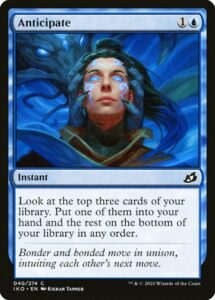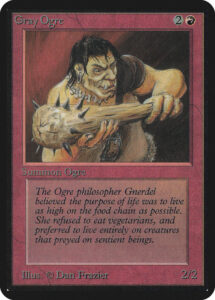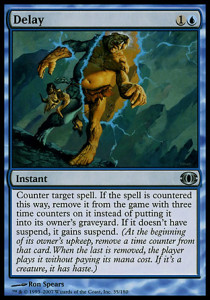This past weekend, I had the pleasure of drafting Mystery Booster twice, and it was glorious. There’s few things I love more than a good team draft with good friends, and that’s a treat I’m hopefully I’ll get to enjoy much more this summer than I have the past couple of years. (Even if it involves everyone testing every single time, it’s a small price to pay to make it happen.)
While I had the pleasure of playing a bonkers deck with Elesh Norn, Grand Cenobite, Mirran Crusader, All is Dust, Deadly Tempest, Debtor’s Knell, and a bunch of “as a pregame action, reveal Chancellor of the Annex,” my second and far weaker deck required far more effort to function and got me paying much more attention to a far simpler card: the humble Anticipate.

Sculpting a Hand
There’s a lot that can be said about Anticipate. We could talk about how Magic has embraced Impulse effects in recent years, but we did that last year. We could talk about the history of blue Impulse effects, how they’ve grown and contracted over time, and there’s a lot to say there. We could discuss alternate versions of this effect like Strategic Planning or Dig Through Time. Perhaps we will another day. But there were two things that really stuck out to me: one central to Anticipate in particular, and the other part of how it’s used.

Strictly weaker, yet fascinating design
Anticipate is an excellent example of a weaker version of a card deemed too powerful for Standard. When it was printed in Dragons of Tarkir seven years ago, people were excited. Back then, Telling Time was played in Modern as a poor Impulse substitute (and even then, it was generally frowned upon). Anticipate could have been the alternative to Think Twice that Jeskai control players like me were looking for. I still have my receipt for the $3.89 I paid for a foil one for my cube—and nothing came of it. Anticipate went from a hyped Modern card to a dud Standard card reprinted multiple times until it rotated out of Standard this past fall and no one noticed.
Magic has plenty of room for strictly better and strictly weaker versions of cards. Standard employs an MC Escher stairwell to feel like its always growing in power, but an actual constant increase in power would lead to Vintage levels of power creep. The majority of cards are not and can not be the most powerful implementations of their effects—imagine Limited if every common two drop were on par with Thalia, Guardian of Thraben, [mtg_card]Ledger Shredder[/mtg_card], or Tarmogoyf. And sometimes the simplest of effects, be it a Lightning Bolt or an Ancestral Recall, proves to be overpowered and needs to be replaced with Shock and Concentrate.
Psychologically, it feels different for me when I know I’m playing with an inferior version of a familiar effect. All those years of casting Mana Leaks after growing up casting Counterspells. I have this odd sensation that “this isn’t as good as it could be” when I draft Time Warp in Vintage Cube (a very powerful card) when the vastly superior Time Walk is in the same draft.
I’m a little disappointed by my foil Demilich, since the Arena version doesn’t die to Lightning Bolt, but I can’t put a real copy of it in my cube. The ability to feel bad about using an inferior version of an effect is an enthralling phenomenon within game design. It’s also highly unusual—most games don’t survive long enough to have constantly comparable content, and absolutely none are as long-lived and broad in content as is Magic: The Gathering.
Delayed gratification
This may be a strange thing to say, but my favorite part of playing Anticipate this weekend was waiting to use it. I had multiple games where I could have used it on turn two, but opted not to. The reason was simple: I wasn’t certain what I would need from it. If I was land-light and didn’t have a great turn three play, I could just wait, and if I drew lands, I’d be able to Anticipate for a spell instead of a land and avoid flood. Even if I was full on lands, if I wasn’t under pressure for my opponent, I didn’t know whether the next spell I’d need would be removal, a bit of pressure, or one of my top-end threats.
I haven’t felt like that kind of patience has been present often lately. Streets of New Capenna proved to be an aggressive format, as did Kamigawa: Neon Dynasty. That’s not a strike against those formats, and it’s not as though 2022 has a monopoly on needing to have plays on turn two. Contemporary Magic feels fast, where players need to have consistent, mana-efficient plays on turns 2-5 and don’t often run out of ways to spend their mana.
There simply isn’t as much need for a smoothing effect like Anticipate, while cheaper cantrips like Consider need to be cast more proactively by virtue of them seeing far fewer options. I don’t believe Magic would be better if patience were always a virtue—frankly, I think it’d be worse—but it was nice having a little more of that. It made me feel smart, and that’s one of the joys of this brain-testing card game of ours.
And with that, we close the chapter on Anticipate. For all we know, actual Impulse could return to the game without causing any ripples—there’re a lot more powerful things you can do for two mana than draw one card. Or perhaps that extra card is like Lightning Bolt‘s extra point of damage and it’s enough to create problems. I think it’s more likely the former than the latter, but I also don’t think Magic needs the effect right now. Smoothing mechanics and card advantage are abundant, so there’s less need for dedicated (and relatively expensive) Impulses. But every now and them, it’s nice to remember the joy of casting these cards—or better yet, waiting to.
Zachary Barash is a New York City-based game designer and the last commissioner of Team Draft League. He designs for Kingdom Death: Monster, has a Game Design MFA from the NYU Game Center, and does freelance game design. When the stars align, he streams Magic (but the stars align way less often than he’d like).


